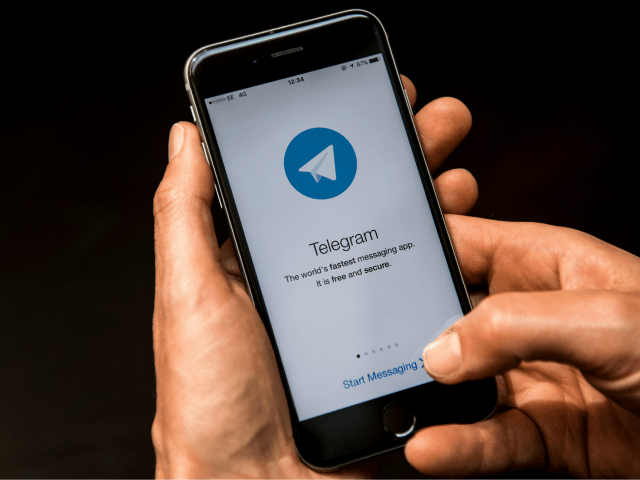A court in the Espirito Santo state of Brazil on Wednesday ordered a temporary suspension of the secure messaging platform Telegram because it refused to provide information about neo-Nazi groups that allegedly used Telegram posts to incite violence in schools.
Brazil’s federal police secured a court order for the information after a horrifying wave of gun, axe, and knife attacks on young children over the past few months. Brazilian Justice Minister Flavio Dino announced a crackdown on social media two weeks ago, demanding platforms ban users who are “promoting or supporting attacks or violence against schools.”
Dino’s edict included orders for social media companies to send data on such users to the police, with fines of up to $2.4 million awaiting platforms that do not comply. When Twitter refused Brazil’s censorship demands, Brazilian users accused the company of “supporting massacres.”
Telegram prides itself on maintaining the security of its encrypted communications and the privacy of its users and has found itself on the front lines of the worldwide Internet privacy wars many times over the years as a result. The company has occasionally agreed to restrictions in extreme cases, such as blocking channels employed by terrorist groups like ISIS.
Telegram CEO Pavel Durov credits the platform’s general commitment to privacy for its explosive growth to over 500 million users. The platform is very popular across South America, in part because users trust Telegram to protect their privacy from authoritarian governments. In Brazil, roughly two-thirds of smartphone owners have downloaded the Telegram app.
One of the Brazilian school attackers was wearing a swastika pin when he shot and killed four victims at two different schools in Espirito Santo in November. The 16-year-old killer was a former student at one of the schools in the town of Aracruz who stole a semi-automatic pistol and a revolver from his father, a police officer. He reportedly planned his attack for two years before carrying it out.
Federal investigators obtained an order from the state court for Telegram to supply information on the members of two groups variously identified as “hate groups,” “anti-Semitic,” and “neo-Nazi.” The police said these groups circulated “Nazi content, violent videos, murder tutorials, and bomb-manufacturing instructions.”
“There are groups there called anti-Semitic fronts operating on these networks. We know that this is at the root of violence against our children and adolescents,” Dino said on Wednesday.
“Platforms must collaborate with society in preventing violent acts caused by extremists. Brazil is not a land without law,” asserted Communications Minister Paulo Pimenta.
Durov said on Thursday that complying with Brazil’s demands was “technologically impossible,” as well as contrary to Telegram’s operating principles.
“In cases where local laws go against this mission or impose technologically unfeasible requirements, we sometimes have to leave such markets,” Durov warned.
“In the past, countries like China, Iran, and Russia have banned Telegram due to our principled stance on the matter of human rights. Such events, while unfortunate, are still preferable to the betrayal of our users and the beliefs we were founded on,” he said, throwing down a gauntlet before the Brazilian government. Durov founded Telegram in Russia, but the company currently operates out of Abu Dhabi.
Espirito Santo Judge Wellington Lopes da Silva on Wednesday banned Telegram from operating in Brazil until it fully complies with the court’s demand for information on its users, and added a fine of $197,780 per day. He ordered Brazilian companies to shut down access to Telegram – a barrier that is generally not difficult to circumvent, using virtual private network (VPN) technology – and stop allowing Brazilians to download the app.
“We are appealing the decision and are looking forward to the final resolution. No matter the cost, we will stand up for our users in Brazil and their right to private communication,” said Durov.
Telegram was suspended nationwide in Brazil once before, in March 2022, when the company refused court orders to block certain users and provide personal information on others, prominently including conservative blogger Allan dos Santos.
Brazilian Supreme Court Justice Alexandre de Moraes, a censorship-happy judge who in the past has ordered violent raids on suspected conservatives for allegedly spreading “fake news,” accused dos Santos of “spreading falsehoods” to aid then-incumbent President Jair Bolsonaro’s re-election effort. Bolsonaro supporters cried foul, since many of them were ardent Telegram users, so shutting down the platform would severely hinder his campaign.
On that occasion, Durov said there was a “miscommunication” between his company and the Brazilian Supreme Court that led to the public conflict and ban.
“I apologize to the Brazilian Supreme Court for our negligence. We definitely could have done a better job. We complied with an earlier court decision in late February and responded with a suggestion to send future takedown requests to a dedicated email address. Unfortunately, our response must have been lost, because the Court used the old general-purpose email address in further attempts to reach us.,” Durov said.
Telegram was reinstated in two days after agreeing to many of the Brazilian Supreme Court’s demands, including the deletion of dos Santos’ accounts, removing classified documents that were posted on the platform by Bolsonaro, and agreeing to put warning labels on posts containing “false information.” Bolsonaro went on to narrowly lose the presidency to left-wing former convict Luiz Inacio Lula da Silva.

COMMENTS
Please let us know if you're having issues with commenting.